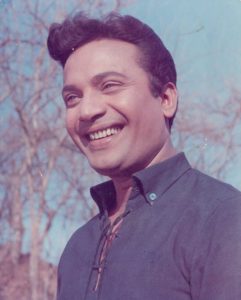This is the story of a clerk who became an actor; an actor who became a star; a star who became an icon and an icon who became a legend almost a demigod and of whom even Satyajit Ray said: “There is none like Uttam and there will be no one to ever replace him. He was and he is unparalleled in Bengali, even Indian cinema.”
Uttam Kumar (1926-1980) is a titanic figure in Bengali public life. He was a leading actor, a matinee attraction, an extraordinary performer, a textbook star and an industry behemoth, dominating Bengali cinema’s commercial and cultural assets for close to three decades.
He won six BFJA awards; the first national award for best actor in 1967; was the only living person whose life was fictionalized by Satyajit Ray; and whose work has been repeatedly remade into Hindi with at least nine actors replaying roles originally played by him alone.
Uttam’s screen persona has also managed to attain a distinguished afterlife; having included, over the years of television, a new generation of viewers.
 A definitive cultural and critical biography of this towering figure of cinema was long overdue. “Uttam Kumar – A Life in Cinema” (Bloomsbury) by Sayandeb Chowdhury is the story of his cinema, the time of that cinema, and the afterlife of that time. With Uttam Kumar as the chief protagonist, this book tells the story of Bengali cinema between 1950s and 1970s, with a comprehensive post-mortem of his legacy.
A definitive cultural and critical biography of this towering figure of cinema was long overdue. “Uttam Kumar – A Life in Cinema” (Bloomsbury) by Sayandeb Chowdhury is the story of his cinema, the time of that cinema, and the afterlife of that time. With Uttam Kumar as the chief protagonist, this book tells the story of Bengali cinema between 1950s and 1970s, with a comprehensive post-mortem of his legacy.
To do so and to stay close to the richness of its subject, the book abandons an exclusive academic template and includes anecdotal prattle, industry chatter, urban legends, incipient filmy folklore etc., because those are important channels of appreciation, appraisal, and comprehension of a star figure.
The primary conceptual aim for the book is to be able to encompass the importance of the figure – to try to locate a celluloid life within a larger historical, political and cultural context. A complimentary metier of the book is to explore why and how a star-persona could reconstitute the bhadrolok Bengali visual cultural world in the post-Partition period.
Born in the late 1970s Chowdhury is the right-mix audience who grew up in an era still very much enamoured by the touring presence of Uttam Kumar, as he continued to rule the Sunday cinema space on Doordarshan for the Bengali audience. Sayandeb Chowdhury teaches in the School of Letters at Ambedkar University Delhi and is a doctoral fellow in the Department of Film Studies, Jadavpur University, Kolkata.
His research and teaching interests are in colonial and postcolonial visual modernisms, cinema and photography studies, adaptation studies and city studies.
His essays have been published in Film International, Journal of South Asian History and Culture, South Asia Review, European Journal of English Studies, Economic and Political Weekly (EPW), and scholarly collections like “Rituparno Ghosh: Cinema, Gender and Art” (2016), “Sea Narratives: Cultural Responses to the Sea 1600-Present” (2016), “L’entree en ville: Amenager, Experimenter, Representer” (2017), “Mistrust: Developmental, Cultural, and Clinical Realms” (2017), “On the Politics of Ugliness” (2018) and “Ideas of the City in Asian Settings” (2019).
He was a UKNA Fellow at the International Institute of Asian Studies, Leiden, in 2015 and a Charles Wallace Fellow in 2016. He has written on art, books, politics and cinema for Huffington Post, The Monthly Review, Art India, Caravan Magazine, Cafe Dissensus, Outlook, Biblio, Indian Express, Critical Collective, TheWire, Scroll, Business Standard, The Hindu, Anandabazaar Patrika and others. (IANS)



